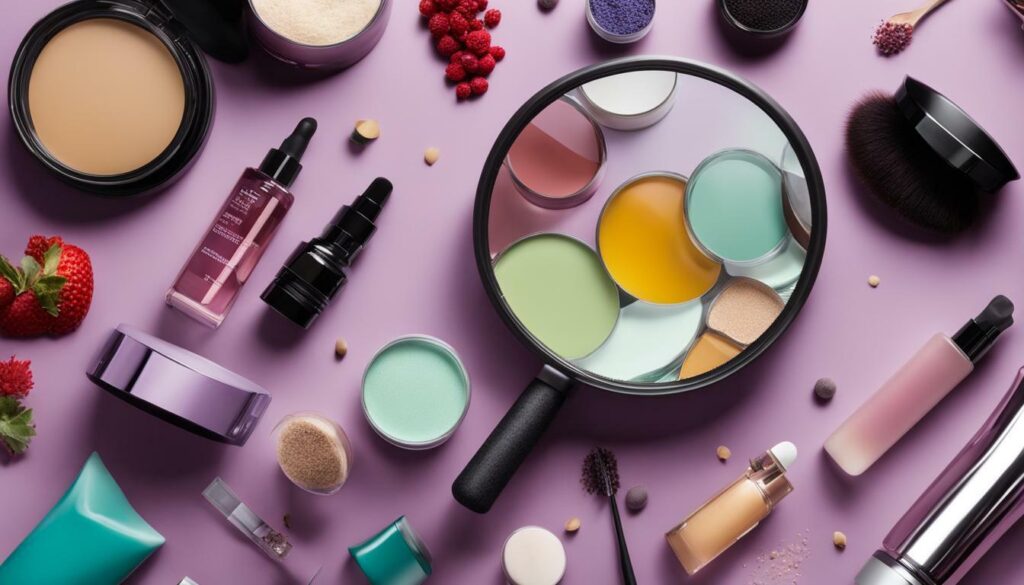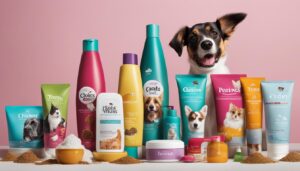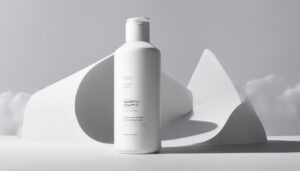Working with skin care manufacturers requires careful consideration and adherence to best practices in order to establish a successful partnership. This guide will provide you with valuable insights on how to collaborate effectively with skin care manufacturers, highlighting the dos and don’ts to keep in mind throughout the process. By following these guidelines, you can avoid common mistakes and ensure a smooth and prosperous working relationship.
Key Takeaways:
- Start your skin care line even if you don’t feel ready.
- Conduct thorough research on the industry, trends, and competition.
- Find a niche within the skin care market to differentiate yourself.
- Invest in your skin care brand by developing a strong brand identity and story.
- Build a relationship with a reliable and trustworthy skin care manufacturer.
Researching the Industry and Finding Your Niche
Before collaborating with a skin care manufacturer, it is crucial to conduct extensive research on the industry, including understanding current trends, market demands, and potential competition. This research will help you make informed decisions and establish a successful relationship with your chosen manufacturer.
Start by researching the latest skincare trends and consumer preferences. Look for emerging ingredients, innovative formulations, and popular product categories. This information will help you identify gaps in the market and find a unique niche for your brand.
Additionally, take the time to study your competition. Analyze their product offerings, marketing strategies, and target audience. Understanding what other brands are doing will allow you to differentiate yourself and position your skincare line in a compelling way.
To establish a successful relationship with a skin care manufacturer, it’s important to select a reputable partner. Look for manufacturers with a proven track record, positive client testimonials, and a commitment to quality and compliance. Consider factors such as their production capacity, expertise in specific product categories, and ability to meet your unique requirements.
Important factors to consider when choosing skin care manufacturers:
- Quality certifications and compliance with regulatory standards
- Communication and responsiveness
- Flexibility and willingness to accommodate customization
- Pricing structure and minimum order quantities
- Lead times and delivery capabilities
By investing time and effort into researching the industry and finding the right niche, as well as selecting a reputable skin care manufacturer, you will set yourself up for success in the competitive skincare market. Remember, a strong foundation of knowledge and partnerships is key to creating a thriving skincare brand.
| Important factors to consider when choosing skin care manufacturers | Quality certifications and compliance with regulatory standards | Communication and responsiveness | Flexibility and customization options | Pricing structure and minimum order quantities | Lead times and delivery capabilities |
|---|---|---|---|---|---|
| ✔️ | ✔️ | ✔️ | ✔️ | ✔️ |

Building Your Brand and Establishing Trust
To ensure a successful collaboration with a skin care manufacturer, it is essential to build a strong brand identity and establish a foundation of trust. Investing in your skin care brand by developing a unique brand story and visual identity will help you stand out in a crowded market. Consumers are increasingly drawn to brands that convey authenticity and a sense of purpose, so take the time to craft a compelling narrative that resonates with your target audience.
An effective way to build trust with your chosen skin care manufacturer is to conduct thorough research on their reputation and track record. Look for manufacturers that have experience working with brands similar to yours and have a proven track record of delivering high-quality products. Additionally, consider reaching out to other businesses in the industry for recommendations or conducting a site visit to see their facilities firsthand. This research will give you confidence in your choice and help establish a solid working relationship.
Another successful strategy for contracting with a skin care manufacturer is to foster open and transparent communication. Maintain regular contact with your manufacturer and discuss your goals, expectations, and any concerns that arise. Clear communication will ensure that both parties are on the same page and can address any issues promptly. Having open lines of communication also allows for collaboration and problem-solving, which are crucial for a successful partnership.
Remember, when working with a skin care manufacturer, it’s important to choose a partner that aligns with your values, offers competitive pricing, and demonstrates a commitment to meeting your specific needs. By following these best practices and strategies for collaboration, you can build a strong brand and establish a trusting relationship with your skin care manufacturer, setting the stage for a successful venture in the skincare industry.

Avoiding Pitfalls and Common Mistakes
While working with skin care manufacturers, it is crucial to be aware of common pitfalls and avoid making certain mistakes that may hinder the success of your collaboration. By being mindful of these potential challenges, you can navigate the process more smoothly and achieve your desired outcomes.
1. Don’t hesitate to get started on your skin care line
One common mistake is hesitating to launch your skin care line because you don’t feel completely ready. It’s understandable to want everything to be perfect, but the beauty industry evolves quickly, and delays can result in missed opportunities. Instead, focus on launching your brand with a strong foundation and refine it as you go. Remember, taking action is the first step towards success.
2. Avoid getting too hooked on fleeting trends
While it’s essential to stay updated on the latest trends in the skin care industry, it’s equally important not to lose sight of your brand’s unique identity and values. Don’t get too caught up in following every passing fad. Instead, focus on offering innovative solutions and products that address specific needs within your chosen niche. This will help you build a loyal customer base and establish your brand as a leader in the market.
3. Don’t overlook the importance of a detailed timeline
When partnering with a skin care manufacturer, it’s crucial to establish a clear timeline for product development and production. Not having a well-defined schedule can lead to delays, missed deadlines, and ultimately, a strain on your business. Clearly communicate your expectations to the manufacturer and ensure that they can meet the agreed-upon timeline. This will help you stay on track and deliver your products to the market in a timely manner.
4. Don’t forget to ask about additional costs
In addition to the production costs, there may be additional charges for formulation development or packaging customization. It’s important to have a transparent discussion with your manufacturer about any potential extra costs. This will help you avoid any surprises down the line and ensure that you can budget effectively for the entire production process.
5. Don’t neglect regulatory compliance and packaging requirements
Regulatory compliance and packaging requirements are essential aspects of the skin care industry. Failing to meet these guidelines can result in legal issues, product recalls, and damage to your brand’s reputation. Stay informed about the regulations specific to your target market and make sure your manufacturer is well-versed in these requirements as well. By prioritizing compliance, you can ensure that your products meet the necessary standards and gain the trust of your customers.
By avoiding these common mistakes, you can establish a successful partnership with your skin care manufacturer and achieve your goals in the industry. Stay focused on your brand’s unique identity, maintain open communication with your manufacturer, and always prioritize quality and compliance in your products.

Conclusion
Collaborating with skincare manufacturers can be a rewarding experience if you follow the dos and avoid the don’ts outlined in this guide. By prioritizing research, building your brand, establishing trust, and avoiding common pitfalls, you can ensure a successful partnership that will help elevate your skincare business.
First and foremost, don’t hesitate to start your skincare line, even if you don’t feel completely ready. Trends in the beauty industry evolve quickly, so it’s essential to jump in and begin your journey. However, instead of solely relying on trends, focus on innovation and creating products that stand out.
Thorough research is another crucial aspect of working with skincare manufacturers. Take the time to understand the industry, trends, and competition. This knowledge will help you make informed decisions and find a unique niche within the skincare market that sets your brand apart.
Investing in your skincare brand is equally important. Develop a strong brand identity and craft a compelling brand story that resonates with your target audience. This will help build customer loyalty and ensure a connection between your brand and the products manufactured.
Finally, building a relationship with a reliable and trustworthy skincare manufacturer is key. Ask about detailed timelines, additional costs for formulation development, and stay informed about regulatory compliance and packaging requirements. Open communication and transparency with your manufacturer will lay the foundation for a successful partnership.
Remember, by following these dos and avoiding the don’ts, you can navigate the skincare industry with confidence and achieve your business goals. Good luck on your journey to skincare success!
FAQ
What are the dos of working with skin care manufacturers?
Start your skin care line even if you don’t feel ready. Conduct thorough research on the industry, trends, and competition. Find a niche within the skin care market to differentiate yourself. Invest in your skin care brand by developing a strong brand identity and story. Build a relationship with a reliable and trustworthy skin care manufacturer.
What are the don’ts of working with skin care manufacturers?
Don’t hesitate to get started on your skin care line, as trends evolve quickly. Avoid getting too hooked on fleeting trends and focus on innovation instead. Don’t overlook the importance of a detailed timeline from your manufacturer. Don’t forget to ask about additional costs for formulation development. Don’t neglect to stay informed about regulatory compliance and packaging requirements.
Private Label Skin Care: The Future of Beauty
Discover the exciting world of private label skin care production, its growing trends, and its promising future in the beauty industry today.
Why Private Label Skin Care is Gaining Popularity
The rapid growth of private label skincare is spurred by consumers’ increasing attraction towards personalized, unique, and cost-effective products. The drive for exclusivity and individualism in the beauty industry has propelled this forward-think trend into a solid market reality.
Private label skincare holds promising future potential. With its capacity to adapt to dynamic consumer needs and trends, alongside the industry’s openness for innovation and customization, it is poised to redefine and rule the ‘new normal’ in skincare.
Understanding the Private Label Manufacturing Process
Private label manufacturing commences with concept birth. It’s where your vision for particular skin, hair, or personal care products starts to materialize, guided by experienced manufacturers.
Private label manufacturing is a seamless blend of creative ingenuity and scientific precision, transforming concepts into high-quality, distinctive personal care products that answer specific market needs.
The creation phase deciphers the enigma of the technical process. It encompasses formulation development, testing, and production – a tribute to both art and science.
Factors such as formulation stability, packaging compatibility, and product consistency are integral parts of the manufacturing process. These necessitate critical attention to detail and a balance of scientific precision and creative ingenuity.
Private label manufacturers are equipped with in-depth industry knowledge and capacity for innovation. It allows companies to create unique, high-quality products that cater to specific market demands.
In a nutshell, private label manufacturing takes an idea and breathes life into it. This co-creation process of product ideation, development, packaging, and deployment fuels the private label skin care industry, driving its appeal to companies and consumers alike.
Benefits of Private Label Skin Care Products
Private label skin care offers businesses a significant value proposition with potential for high returns. It provides an opportunity to create a unique, customized product line that stands out in the market. Concurrently, consumers are more inclined towards private label products due to their perceived value, quality, and the ability to meet specific skin care needs.
- Customized product line setting apart from competitors
- Potential for high returns
- Perceived value and quality attracting consumers
- Ability to cater to specific consumer skin care needs
Customization Options for Private Label Skin Care
One surefire way to make your private label skin care line distinct is through innovative customization. Ample options in custom formulation provide opportunities to craft a unique product line.
- Choose from a variety of product types, like serums, creams, masks, or brushes
- Explore different active ingredients to target specific skin problems
- Personalize the product packaging for brand recognition
- Opt for scented or unscented formulations
- Decide on the product consistency – lotion, gel, or oil
- Include specialty additives like vitamins or botanicals
Trends in Private Label Skin Care
Innovation is at the heart of private label skin care manufacturing. Cutting-edge technologies enable the creation of products featuring potent active ingredients, delivering targeted results that today’s beauty-conscious consumers demand.
Current trends are greatly influencing the private label skin care landscape. The shift towards clean beauty, CBD-infused products, and minimalist routines reflect a consumer base that values wellness, sustainability, and effective skin care solutions.
Clean Beauty: The Rise of Natural and Organic Products
In the beauty industry, the trend towards embracing handcrafted, organic private label products signifies a shift towards the ethos of ‘Clean Beauty’. This revolution is driven by consumers’ increasing demand for healthier, more responsible alternatives, supported efficiently by private label manufacturing.
- Private label manufacturing enables the production of high-quality organic beauty products.
- The ‘clean beauty’ revolution has gained momentum from consumers demanding greener, cleaner products.
- Private label organic skincare products can offer a healthier alternative to mainstream beauty products.
- Consumers’ trust in organic products is boosting the growth of private label ‘clean beauty’ brands.
- Private label manufacturing supports small businesses looking to establish themselves in the organic beauty market.
CBD Infused Skin Care: A Growing Market
The ‘Green Rush’ has expanded into the beauty industry with private label manufacturing offering CBD-infused skin care products. As the market embraces botanical power, CBD emerges as a potent ingredient in private label skin care, unlocking a new sphere of possibilities.
- Revolutionizing industry standards with CBD-infused private label skincare
- Capitalizing on the ‘Green Rush’ in the beauty sector
- Discovering the benefits of CBD in skincare products
- Enhancing product line with CBD-infused solutions
Minimalist Skin Care: Simplifying Beauty Routines
In the ever-evolving beauty market, private label manufacturers play a key role in embracing the minimalist skincare trend. They allow businesses to simplify their offerings, focusing on essential, high-efficacy ingredients and streamlined regimens.
- Private label manufacturers offer a back-to-basics approach by stressing on essential ingredients.
- By simplifying beauty routines, private labels are capturing the minimalist skincare trend.
- Simplicity in packaging and formulation resonates with consumers seeking a less-is-more approach in skincare.
- Private label skin care allows brands to create products tailored to minimalist skincare needs.
Private Label Skin Care for Different Skin Types
Recognizing that one size doesn’t quite fit all in skincare, private label manufacturers are now customizing formulations to meet diverse skin needs, offering solutions from sensitive skin soothers to anti-aging formulas.
Embracing skin diversity, private label skincare pivots towards tailoring products for various skin needs, be it acne-prone, dry, or hyperpigmented skin, promising a targeted, more personal skincare experience.
Sensitive Skin Solutions
Private label skincare companies provide tender care for sensitive skin, specializing in the formulation of mild and hypoallergenic products. Proficient in crafting solutions matching the unique needs of this skin type, these companies bring gentle goodness to the beauty aisle.
These manufacturers not only prioritize non-irritant ingredients but also rigorously test every product for suitability. Their meticulous commitment ensures individuals with sensitive skin can use these products without fear of adverse reactions.
The growing demand for sensitive skin care is effectively met by private label manufacturing. It offers the chance to create an exclusive line of products aimed at appeasing delicate skin with calming ingredients.
From soothing facial cleansers to hydrating serums and barrier repair creams, private label manufacturing empowers brands to cater to the sensitive skin market with aplomb. Embrace this trend and make skin care comfortable, beneficial, and enjoyable again.
Anti-Aging Formulas
The private label skin care industry is capitalizing on advances in science to introduce cutting-edge ingredients into anti-aging formulas. Ingredients like retinol, hyaluronic acid, and peptides are the new norms, offering profound results.
Private label skin care is revolutionizing beauty treatments. Firms are creating anti-aging formulas that don’t merely mask signs of aging but work at a cellular level to repair and rejuvenate the skin.
Innovation in skincare is driving the demand for private label anti-aging formulas higher. These products incorporate scientific advancements and fresh organic extracts to target skin-aging factors.
Stalwarts such as antioxidants, Vitamins C and E, and green tea extracts continue to be popular in private label anti-aging formulas. Additionally, newer ingredients like bakuchiol, a plant-based alternative to retinol, are making inroads.
Private label manufacturers are pushing the envelope by introducing groundbreaking anti-aging solutions. These products promise reduced wrinkles and improved skin texture while also catering to specific factors ranging from dryness to discoloration.
Acne-Fighting Products
Private label acne solutions owe their effectiveness to top-notch manufacturing processes and well-researched ingredients. Combining both ensures skin-friendly products that actively fight acne.
Harnessing the power of proven anti-acne ingredients, these formulas transform skin health. They regulate oil, prevent pore clogs, fight bacterial growth, and minimize inflammation.
Products are diligently formulated considering acne-prone skin specificities. Expect a curated blend of salicylic acid, benzoyl peroxide, and natural ingredients like tea tree oil.
These acne-fighting solutions penetrate deep into the skin, treating current breakouts while preventing future ones. Continuous usage leads to visibly clearer, healthier skin.
Therefore, selecting private label for acne-fighting products ensures access to current, innovative formulas. It’s a winning strategy for brands aiming to cater to a market facing acne issues.
Hydration Boosters
Unleashing the science of quenching skin’s thirst, private label hydration boosters are specifically designed to lock in moisture and restore skin’s radiant glow. Supercharged with humectants and emollients, these products captivate users with their game-changing hydration prowess.
Innovation in private label skin care products pushes the boundaries of skin hydration. These avant-garde products energize skin cells, amplify water retention, and rejuvenate dry patches, providing the much-needed surge of hydration for impeccably plump and dewy skin.
How to Choose a Private Label Skin Care Manufacturer
Selecting the right private label skin care manufacturer hinges on multiple factors. Key considerations are production capacity, formulation expertise, packaging options, minimum order quantities and a thorough understanding of current beauty trends.
A successful partnership with a private label skin care manufacturer lies in clear communication, setting realistic expectations, maintaining a committed relationship, and ensuring your goals align with their capabilities and product portfolio.
Factors to Consider when Selecting a Manufacturer
In choosing a private label skin care manufacturer, it’s vital to weigh the essentials. This means considering not only their production capacity but also their ability to innovatively create formulations that reflect your brand vision. Check for proven expertise, flexibility, and a customer-centric approach.
While the basics are important, going beyond them can bring long-term success. Seek a manufacturer who stays updated with industry trends, shows a commitment to sustainable practices, and understands regulatory compliance even in different markets.
Consider a company’s reputation and track record, too. Researching their past partnerships, reviews, and customer testimonials can help ensure that they deliver consistency, quality, and timeliness.
Also, understand the scale of their operations. A manufacturer capable of meeting increasing demand without compromising on quality, as your brand grows, can be a valuable partner in your private label journey.
Ensuring Quality Control and Safety
Adopting effective quality control mechanisms in private label skincare manufacturing is key. It not just safeguards your brand reputation but also ensures that the products comply with the set industry standards.
Regular quality inspections help in identifying potential issues and resolving them swiftly. By doing so, the final product becomes flawless, upholding your brand integrity.
In the world of private label manufacturing, the safety of the customers is paramount. Rigorous safety checks allow us to offer products that are safe, reliable, and effective.
Through stringent safety tests, we can eliminate harmful substances from the formulations. This not only guarantees the safety of the final product but also ensures that your customers’ skincare needs are met with utmost care.
Vetting Suppliers and Checking Certification
With a saturated market of private label skin care suppliers, proper vetting is essential. Not only does it help establish trust, but it also ensures the quality and safety of your product range.
Verification of supplier credentials provides an extra layer of security. Confirmation if they comply with industry standards and practices is crucial to a successful line of beauty products.
Industry certifications offer another layer of assurance. For instance, suppliers may be organic certified, cruelty-free, or sustainably sourced. Each adds value to a brand, in addition to ethical credibility.
The importance of checking supplier certifications cannot be understated. When your brand’s reputation is on the line, you want to ensure that the manufacturer meets international standards for safety and quality.
Selecting a vetted and certified supplier for your private label skin care venture simplifies operations. With due diligence accomplished, entrepreneurs can confidently expand their product lines while preserving their brand identity.
Private Label Skin Care: A Lucrative Business Opportunity
Investing in private label skin care opens a gateway to limitless opportunities in the beauty industry. Notable profitability and control over product identity make it a desirable route for companies.
Grasping the business potential of private label skin care means understanding its growth enablement. It provides an unparalleled opportunity to create and scale a brand with unique identity and consistency.
Start Your Own Private Label Skin Care Brand
You might have wondered about the steps to start your own Private Label Skin Care Brand. Beginning a skincare journey requires extensive planning. You’ll need to understand your mission, research potential manufacturers, pinpoint your target audience, and develop a strong marketing strategy.
Building a successful private label skin care brand involves combining passion and knowledge of the beauty industry. Understanding the wants and needs of your target market will help you create products that resonate with them.
Remember to focus on the uniqueness of your brand. Differentiate your private label skincare line from existing products on the market. It can be as simple as focusing on a specific skin concern or emphasizing clean, minimalistic ingredients.
Choosing the right manufacturer is a key step. Look for manufacturers that offer flexible customization options, provide quality assurance, and prioritize transparency in sourcing and manufacturing processes. This ensures the delivery of quality skin care products under your brand.
Finally, the key to any successful brand is maintaining consistency and integrity. Make sure all your products align with your brand’s mission and values. Review your skincare line regularly and be prepared to adapt to the ever-changing beauty trends.
At Shay Labs, we believe in providing exceptional value to our clients. That’s why we offer a complimentary consultation with one of our industry experts. We understand that every company has its unique manufacturing needs, and our expert will take the time to understand your specific requirements and goals.
Through this free consultation, you’ll gain valuable insights and guidance on how to optimize your beauty product manufacturing process. Our expert will share their knowledge and experience, helping you make informed decisions to maximize the success of your business. Take advantage of this opportunity to collaborate with one of our experts at no cost to you. Contact us today to schedule your free consultation and discover the possibilities with Shay Labs.





